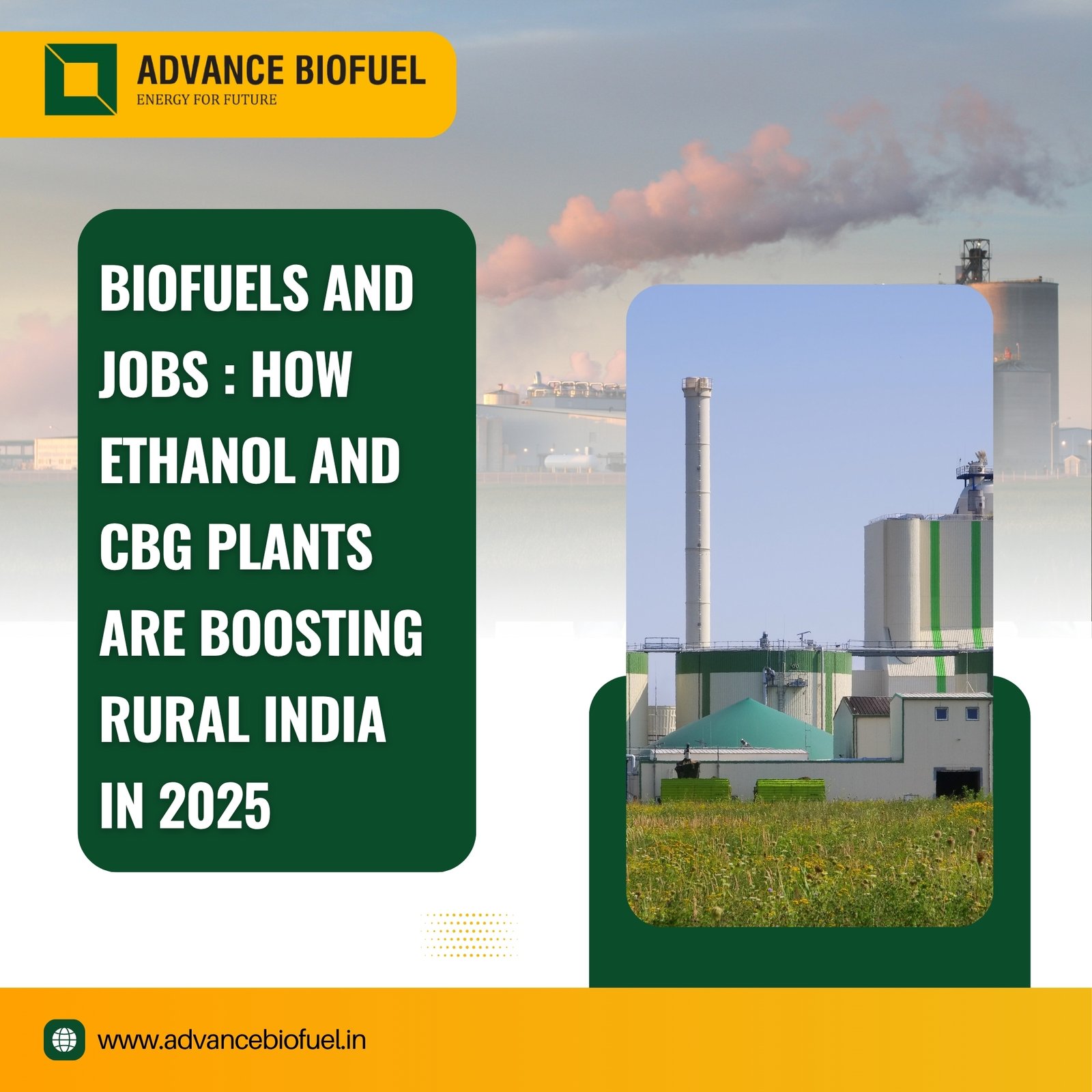The villages of India are quietly becoming the heart of a new energy revolution. As the country looks beyond fossil fuel, ethanol and compressed biogas (CBG) have advanced not only as a clean option but also as unpredictable drivers of rural prosperity. This change makes it special because it directly connects with people’s lives.
Farmers who once saw crop residues as useless waste are now looking for stable buyers, while local youth are searching for a new career path inside modern biofuels plants. These changes are helping to earn more for rural communities, live in their hometown, and at the same time contribute to India’s renewable energy goals. Advance Biofuel a leading biofuel manufacturer in India, we have seen that these projects are more than only energy enterprises; they are turning into engines of jobs, development, and hope for rural India in 2025.
How Ethanol and CBG Plants Create Jobs in Rural Areas
Ethanol and compressed biogas (CBG) are among the most direct benefits of the installation of plants, bringing a wave of employment that they bring to rural areas. For farmers, the opportunity starts correctly at the farm gate. Crop residues, sugarcane products, and other agricultural waste-one bar are seen as a feedstock seen as Valules. This provides an additional stream of income to farmers, while stubble resolves a long – released issue of burning and waste disposal.
But the effect is beyond agriculture. In rural areas, youth, who often struggle to find stable work close to the house, are getting employment in biofuel units as operators, technicians, and logistics staff. From driving collection trucks to machinery management and maintaining equipment, these roles provide both stability and skill development.
At Advance Biofuel, we have seen how every new project can change an entire community – can turn villages into the center of activity, reduce migration in cities, and create a sense of pride between the local people who feel part of India’s clean energy journey.
Local Feedstocks Powering Rural Growth
A major reason for biofuel projects becoming so effective in rural India is their dependence on resources that are already available locally. On Advance Biofuel, our ethanol plants use sugarcane jaggery, a by-product of the sugar industry, while our CBG features process crop residues such as rice straw, wheat husk, and other agricultural waste. These materials are often abundant in villages, but have traditionally decreased or, in some cases, caused environmental issues such as stabling.
By sourcing feedstock directly from farmers, we not only cut transportation costs and emissions but also ensure that economic benefits remain within the community. Farmers receive stable payments for materials that are otherwise unused, while rural supply chains, from collection to storage, create additional jobs. This localized approach converts waste into wealth and strengthens the rural economy by supporting India’s clean energy infection.
Increasing Local Economies Through Biofuel Production
Beyond employment generation, biofuel projects have a major economic impact on rural communities. By setting up ethanol and CBG plants near farming areas, Advance Biofuel ensures that money rotates within local economies rather than flowing to distant urban centers. Farmers earn from supplying feedstocks, transport workers receive employment moving materials, and small businesses such as equipment suppliers and food vendors benefit from the activity, moving around plants.
This multiplier effect strengthens villages economically, reduces migration in cities, and provides long-term stability. The communities become more flexible, capable of investing in thanks to education, healthcare, and all other income sources in homes. In short, biofuel plants act as an engine of rural development, as well as contribute to India’s renewable energy goals and convert agricultural capacity into tangible economic development. This synergy of clean energy and local prosperity makes biofuel production a truly transformational initiative in 2025.
Conclusion
Ethanol and CBG plants are more than producing clean energy only – they are reviving rural India. By creating jobs for farmers and youth, by converting local feedstox into valuable resources, and by strengthening village economies, biofuels are proving to be a permanent solution with a human touch. At Advance Biofuel, we are proud to lead this change, demonstrating that renewable energy and rural prosperity can grow hand in hand.
For communities, businesses, and policymakers equally, the message is clear: supporting biofuel initiatives means jobs, cleaner air, and supporting a strong local economy.


